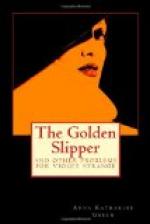“Violet, you are a wonder. But how did you dare?”
This from Arthur as the two rode to the train in the early morning.
The answer came a bit waveringly.
“I do not know. I am astonished yet, at my own daring. Look at my hands. They have not ceased trembling since the moment you threw the light upon me on the rocks. The figure of old Mr. Upjohn in the window looked so august.”
Arthur, with a short glance at the little hands she held out, shrugged his shoulders imperceptibly. It struck him that the tremulousness she complained of was due more to some parting word from their young host, than from prolonged awe at her own daring. But he made no remark to this effect, only observed:
“Abram has confessed his guilt, I hear.”
“Yes, and will die of it. The master will bury the man, and not the man the master.”
“And Roger? Not the little fellow, but the father?”
“We will not talk of him,” said she, her eyes seeking the sea where the sun in its rising was battling with a troop of lowering clouds and slowly gaining the victory.
END OF PROBLEM IV
PROBLEM V
THE DREAMING LADY
“And this is all you mean to tell me?”
“I think you will find it quite enough, Miss Strange.”
“Just the address—”
“And this advice: that your call be speedy. Distracted nerves cannot wait.”
Violet, across whose wonted piquancy there lay an indefinable shadow, eyed her employer with a doubtful air before turning away toward the door. She had asked him for a case to investigate (something she had never done before), and she had even gone so far as to particularize the sort of case she desired: “It must be an interesting one,” she had stipulated, “but different, quite different from the last one. It must not involve death or any kind of horror. If you have a case of subtlety without crime, one to engage my powers without depressing my spirits, I beg you to let me have it. I—I have not felt quite like myself since I came from Massachusetts.” Whereupon, without further comment, but with a smile she did not understand, he had handed her a small slip of paper on which he had scribbled an address. She should have felt satisfied, but for some reason she did not. She regarded him as capable of plunging her into an affair quite the reverse of what she felt herself in a condition to undertake.
“I should like to know a little more,” she pursued, making a move to unfold the slip he had given her.
But he stopped her with a gesture.
“Read it in your limousine,” said he. “If you are disappointed then, let me know. But I think you will find yourself quite ready for your task.”
“And my father?”
“Would approve if he could be got to approve the business at all. You do not even need to take your brother with you.”




